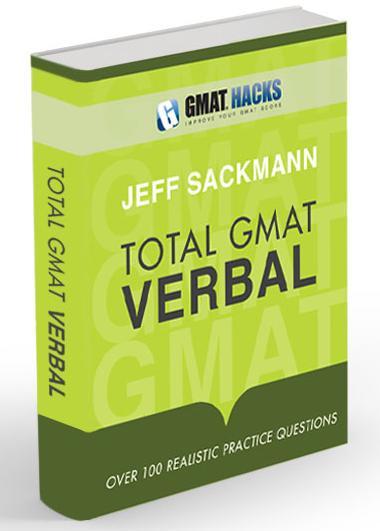
Bookshelf
|
|
Total GMAT Math Jeff's complete Quant guide, on sale now! |
|
|
Total GMAT Verbal Everything you need to ace GMAT Verbal! |
1,800 Practice Math Questions
Buy Jeff's books at Amazon.com

GMAT Official Guide, with IR
OG Math | OG Verbal
OG12 & Quant Rev solutions!
GMAT Question of the Day
Beginner's Guide to the GMAT
GMAT Hacks Affiliate Program

Best of GMAT Hacks

Categories
- General Study Tips
- Goals and Planning
- CAT Strategy
- The Mental Game
- GMAT Math Strategy
- GMAT Math Topics
- Mental Math
- Data Sufficiency
- Critical Reasoning
- Reading Comprehension
- Sentence Correction
- Analytical Writing Assessment
- Business School Admissions
- GMAT Prep Resources
- Practice Questions
- Total GMAT Math
- Total GMAT Verbal

GMAT Question of the Day
January 14, 2014
Every weekday, GMAT Hacks publishes a realistic GMAT practice question. In general, you'll see Quant problems on Monday, Wednesday, and Friday, and Verbal questions on Tuesday and Thursday. You'll always be able to find them at www.gmathacks.com/daily.
Give today's question a try, and check your answer. When you're done, be sure to subscribe so that you can keep practicing every day!
Today's Practice GMAT Question:
|
Economist: The law of demand predicts that as the price of a good goes down, demand for that good will increase, and vice-versa. In a recent experiment, economists gave coupons for rice to families in a province of China, where it is a staple food. The coupons effectively lowered the cost of rice, and should have led the families to buy more of it. Instead, households given the coupons purchased less rice than a control group who did not receive coupons. Which of the following, if true, most helps to explain the amount of rice purchased by families who received coupons? |
|
| (A) | Chinese families spend an unusually high proportion of their income on rice. |
| (B) | The prices of staple goods, including foodstuffs such as rice, do not fluctuate as much as those of non-necessary goods, such as consumer electronics. |
| (C) | In the months before and after the experiment, the average per-family consumption of rice in the Chinese province steadily decreased. |
| (D) | Many of the families given coupons discovered that they could sell the coupons on the black market. |
| (E) | The availability of the coupons meant that families had more money to spend on other things, including more expensive substitutes for rice. |
Click to show answer (opens in new window)
Need more work in this area? In Total GMAT Verbal, there is an entire chapter, including practice problems, that covers Explanation questions.
If you don't already subscribe to the GMAT Question of the Day, start now--it's easy! A new question is published every weekday. You can sign up for all the questions, or just Verbal or Quantitative questions. Click here to subscribe!
About the author: Jeff Sackmann has written many GMAT preparation books, including the popular Total GMAT Math, Total GMAT Verbal, and GMAT 111. He has also created explanations for problems in The Official Guide, as well as 1,800 practice GMAT math questions.
- Previous GMAT Question of the Day
- Question of the Day Archive
- Articles on Critical Reasoning
- Search GMAT Hacks
 |
Total GMAT Verbal
The comprehensive guide to the GMAT Verbal section. Recognize, dissect, and master every question type
you'll face on the test. Everything you need, all in one place, including 100+ realistic practice questions. |